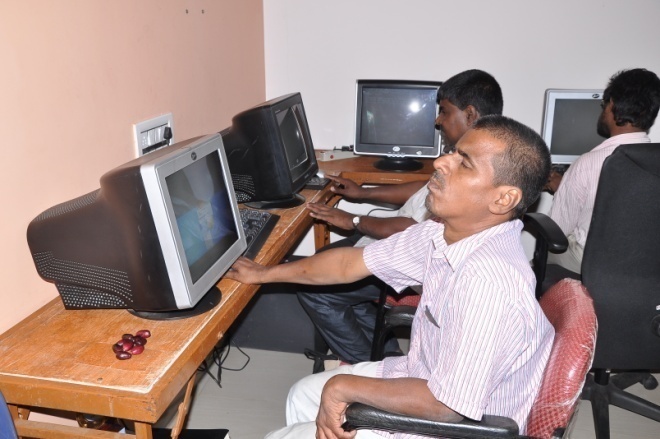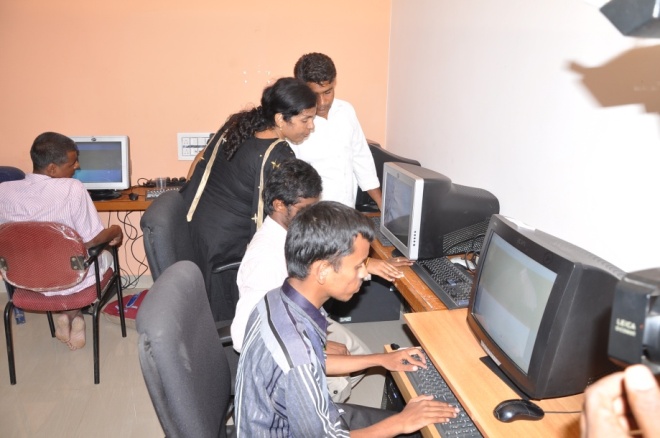|
Rehabilitation FOR VISUALLY IMPAIRD AND DIFFENTLY ABLED |
|
|
India, the largest democratic country in the world, is marching ahead strongly on the growth and developmental front and is poised to be the leader in the market economy. This role creates and increases far greater responsibilities on us in ensuring that the benefit of the developmental cycle reaches each and every citizen of this country, including the abled and the disabled ones. It has been enshrined in the Constitution of India to ensure equality, freedom, justice, and dignity of all individuals and implicitly mandates an inclusive society. With increase in consideration of quality parameters in all spheres of life including availability, access, and provision of comprehensive services to the disabled Concept of disability and rehabilitation
The goal of medicine is to promote, preserve, and restore health when it is impaired and
to minimize suffering and distress. These goals are embodied in the word
prevention. Successful prevention depends upon knowledge of causation,
dynamics of transmission, identification of risk factors and risk groups,
availability of prophylactic or early detection and treatment measures, an
organization for applying these measure to appropriate persons or groups
and continuous evaluation and development of procedures applied.
For better understanding of the subject, it is necessary to have
clarity of sequence of events leading to disability and handicap. Rehabilitation
Rehabilitation involves combined and coordinated use of medical, social, educational, and vocational measures for training or retraining the individual to the highest possible level of functional ability. The three main strategies for rehabilitation of disabled are institution-based, outreach, and community-based.
This project strives for giving PWDs the opportunity to live their lives with dignity and that they are given the facilities and conditions that do not smother their mobility and activity. Further, this project will collaborate and Coordinate with the fragmented program doing in this space in India, increasing the impact of the work. According to the United Nations, India is home to 70 million disabled citizens, with more than 80% of them unemployed. Of those who do find work, a staggering 98.5% work in the informal sector, without income security or access to financial services. Vishwabharathi has been providing skills training and advocating for the employment of persons with disabilities since 2012, as part of our larger commitment to improving the lives of marginalized communities and supporting inclusive development. From past 7 years, through a partnership with many donors, vishwabharathi is providing basic needs, computer education, monthly ration, white canes, eye glasses, CD players, clothes, medical care for 200 visually challenged, those who are living in Bangalore and some other district in KARNATAKA. Doing awareness and advocacy Campaign, providing calipers, crutches wheel chairs for disabled. BELAGU – a program and initiative to Aids and appliances of the challenges faced by persons with disabilities, with particular focus on advocacy for their employment BELAGU which means “light, aims to raise funds for skills training and employment support for more than 500 persons with disabilities, as well as creating awareness and advocate for inclusivity of people with disabilities in employment and in greater society. 

SYMPOSIUM RESULTOF THE DISABLITY1. Understanding disability2. Disability - a global picture 3. General healthcare 4. Rehabilitation 5. Assistance and support 6. Enabling Environments 7. Education 8. Work and employment COMPUTER TRAINIG:The Computer Training Center provides tutorial-training services to visually impaired students. On completion of the training, students will be able to use common computer-processing applications and will be able to read electronic text on screen (with the use of special software), download infor-mation from the Internet for reading or printing, browse online newspapers, do online research and continuously upgrade their skills. The training is of-fered free of cost by the Trust. Our goal is to work towards creating IT awareness and providing knowledge and specialized skills to empower our students in order to make them self-sufficient and independent. We train students on the use of special software such as JAWS, KURZWEIL, and MAGIC. Computer education is provided to students who have passed 10th standard. JAWS:Job Access with Speech (JAWS) is a screen reading software. JAWS convert a regular computer into a talking computer, thus enabling a blind person to work on the computer independently. This software allows a visually chal-lenged to use Microsoft Office and other similar products. Kurzweil:Kurzweil is software application used for reading printed text. A scanner is used to scan the printed text after which the software obtains the image of the page and converts it to actual characters using Optical Character Recognition. A screen reader converts the text on the monitor to voice. Us-ing this software, a visually challenged person can access the information on a printed page. Magic:Magic is a software application used by a person with low vision. Using this software, the text on the screen is magnified to allow a person with low vi-sion to be able to see the text. Magic has a screen reader option as well. The courses we offer students are structured as follows: 1. Basics of Computers:Syllabus: Keyboard orientation, desktop orientation, file/folder manage-ment. 2. Microsoft Word: Syllabus: Usage of key functions of Microsoft Word with a strong focus on navigation, using different views, editing, formatting, saving documents, printing and previewing, tables, mail merge, inserting, formatting etc. 3. Microsoft Excel:Syllabus: Usage of key functions of Microsoft Excel covering the various frameworks and applications of MS Excel with emphasis on spreadsheets and database systems. 4. Microsoft Power Point:Syllabus: Usage of key functions of Microsoft Power Point. 5. Internet Explorer: Syllabus: Introduction to the Internet and the World Wide Web covering email usage, search and querying, reading online information, articles and news etc. Braille Transcription CenterThe Braille Transcription Centre started in 2013 is engaged in transcription work of English and Kannada books into Braille for the benefit of visually impaired students. The center has the services of about 10 volunteers who function as readers of the books while 5 visually impaired students, spe-cially trained in transcription, perform the task of drafting the text in Braille. The Center focuses on the transcription of books that are primarily on fic-tion, knowledge, education, and matters of general interest. All the tran-scribed books are either maintained in the organization’s library for all to read or donated to various institutions/ school run for the visually impaired. The organization runs a Braille training section where young visually im-paired are trained in Braille. The center also focuses on training those who have lost their vision at a later point of time in their lives. The primary objectives of this center are: • Providing the visually impaired with access to reading material• Giving the visually impaired an opportunity to earn a livelihood or supplement their income by providing their services at the center • Donating Braille books to institutions that work for the blind • Teaching Braille to interested, sighted persons to create more awareness and support for the visually impaired community. EDUCATION: Vishwabharathi Charitable Trust conducts training programs for its students. The purpose of these programs is to empower people with visual disabilities in order to give them a level playing field in the employment market. We also aim to educate companies and other employers about the skills and abilities that persons with visual disabilities carry. In the past two years, we have managed to train approximately 100 students. Our programs cover the following areas: Computer training Language skills training Profession related training 

|
|
|
